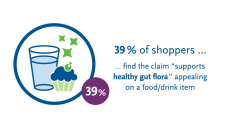Acai may boost survival, for fruit flies at least: NIH Study
The study, published online in Experimental Gerontology, also serves to support the apparent antioxidant properties of the fruit pulp when fruit flies were fed a high fat diet and supplemented with 2 per cent açai pulp.
Changes in age-related gene expression were also reported by the researchers, led by Sige Zou in the Laboratory of Experimental Gerontology at the National Institute on Aging, NIH.
“[Our results suggest] that açai pulp can antagonize the detrimental effects of high fat diets as a functional food,” wrote the researchers. “Further animal model and clinical studies need to be conducted to investigate the effects of açai pulp consumption in prevention of diseases, including diabetes.”
Super fruits from Central and South America
Açai berries (pronounced ah-sigh-ee) have long formed part of the staple diet of Indian tribes. With the appearance of a purple grape and taste of a tropical berry, it has been shown to have powerful antioxidant properties thanks to a high level of anthocyanins, pigments that are also present in red wine.
It is presently being sold in a number of countries, including New Zealand, Australia, South America, Japan, USA, and the Middle East
The researchers used a freeze-dried acai pulp with certified high antioxidant capacity provided by ABrazil LLC, Kendall Park, NJ USA.
Study details
Using Drosophila melanogaster, the researchers fed them a high-fat diet with or without 2 per cent açai pulp. Fruit flies (Drospholia) are a well-known organism for nutritional and medical research and an organism that shares 59 per cent of the human genome.
While the transcription of most genes was not altered, decreaes were observed in phosphoenolpyruvate carboxykinase (Pepck), a key gene involved in the production of glucose from non-carbohydrate sources (gluconeogenesis).
This observation could explain the results observed in human clinical trials reported for commercial açai products that, despite a high sugar content, are found to have a low glycemic index in humans.
An impact on lifespan was also observed in female flies with an altered genetic profile which reduces expression of the superoxide dismutase enzyme, increasing oxidative stress, and thereby reducing lifespan. In açai-supplemented flies the lifespan was increased to non-supplemented flies.
“Açai has the potential to antagonize the detrimental effect of fat in the diet and alleviate oxidative stress in aging,” concluded the researchers.
Source: Experimental Gerontology
Published online ahead of print, doi: 10.3945/ajcn.2009.28549
“Açai palm fruit (Euterpe oleracea Mart.) pulp improves survival of flies on a high fat diet”
Authors: X. Sun, J. Seeberger, T. Alberico, C. Wang, C.T. Wheeler, A.G. Schauss, S. Zou





















